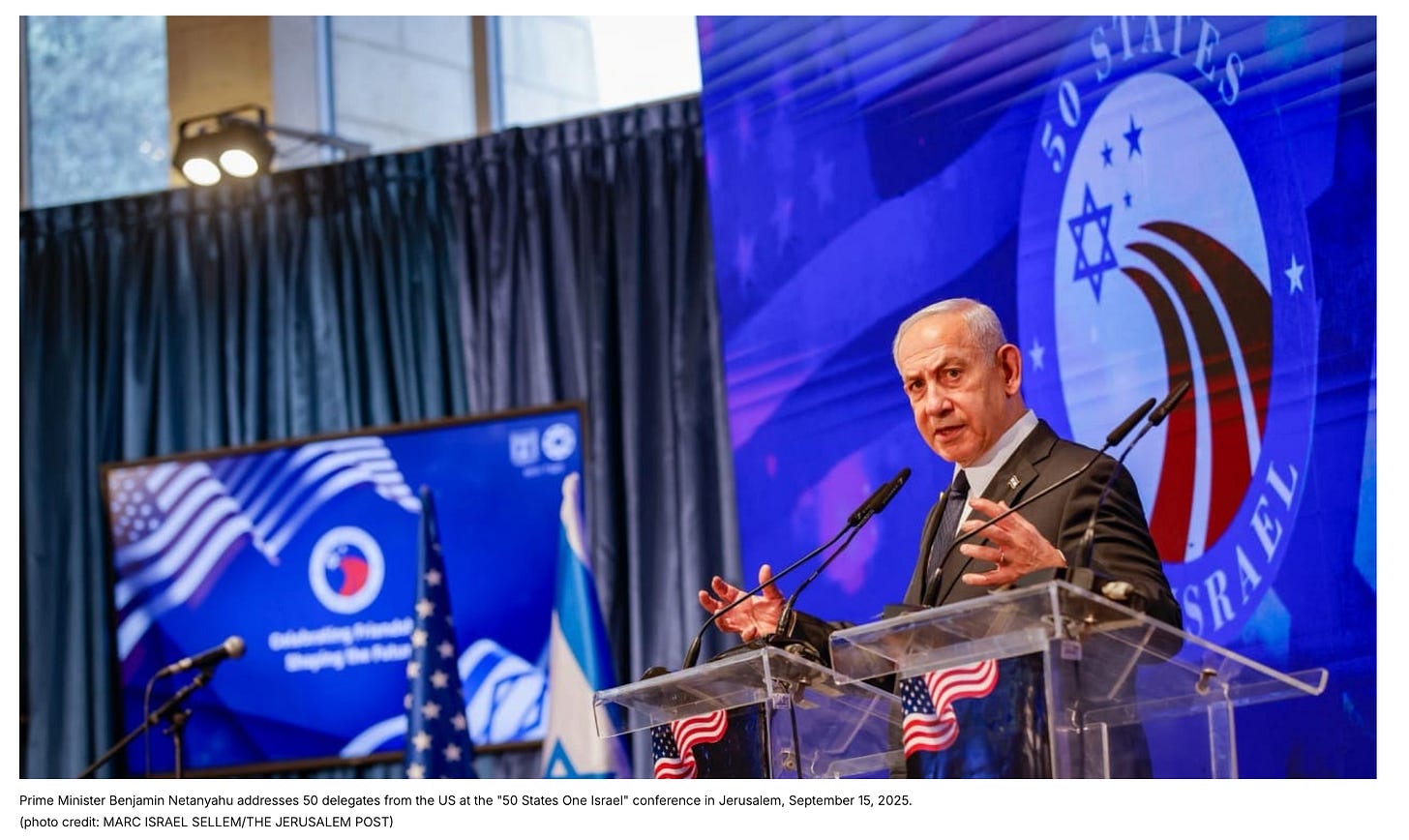A Free Trip to Israel: Was It Appropriate for Vermont Legislators to Be Lobbied by Netanyahu's Government?
Israeli officials directly asked the lawmakers to help them "spread the Israeli narrative in international media" and "stand with us in our just cause."
Last week, as the war in Gaza continued to draw international attention, a bipartisan group of five Vermont state representatives traveled to Israel on a trip fully funded by the Israeli government. The visit has raised questions among Vermonters about the purpose of the trip, the ethics of accepting foreign-sponsored travel, and what might be expected of these lawmakers in return.
The five legislators who took part in the "50 States, One Israel" conference from September 15-18 were:
Rep. Sarita Austin (D-Colchester)
Rep. Matt Birong (D-Vergennes)
Rep. Gina Galfetti (R-Barre Town)
Rep. Will Greer (D-Bennington)
Rep. James Gregoire (R-Fairfield)
They joined approximately 250 other state lawmakers from across the United States for what Israeli leaders described as the largest-ever gathering of American elected officials in their country.
Why Were They Invited? The '50 States, One Israel' Initiative
The "50 States, One Israel" event was a public diplomacy initiative organized and paid for by Israel's Ministry of Foreign Affairs. According to Israeli officials, the primary purpose was to strengthen ties with the United States and allow American lawmakers to see Israel's security, economic, and social landscape firsthand.
In a speech to the delegation, Israeli Prime Minister Benjamin Netanyahu stated the goal was to combat what he called a "coordinated global effort" to undermine Israel's legitimacy. The trip's itinerary included meetings with high-level Israeli officials, visits to the Western Wall, and tours of Israeli communities impacted by the October 7th attacks. Lawmakers were presented with what the organizers called the "Israeli narrative" in the ongoing conflict and global political arena.
A Strategic Focus on Statehouses
A key question is why Israel's government focused this major initiative on state legislators rather than members of the U.S. Congress. The answer lies in a long-term political strategy aimed at building support for Israel from the ground up.
The central policy goal of this strategy is to encourage the passage of anti-Boycott, Divestment, and Sanctions (BDS) legislation at the state level. The BDS movement is a global campaign that promotes various forms of boycotts against Israel. Over 35 states have already adopted laws or executive orders that target the movement, often by preventing the state from contracting with companies that boycott Israel.
By engaging directly with state representatives, the Israeli government can cultivate relationships with officials who may one day run for higher office and, more immediately, influence state-level economic and cultural policies.
Who Paid and What's Expected in Return?
The trip was fully paid for by the Israeli government, a fact confirmed by both organizers and attendees. This included airfare, lodging, meals, and transportation within the country.
While there are no legally binding "strings attached," the expectations are clear. Foreign-sponsored trips like this are a form of soft power and lobbying. The goal is for the attending legislators to return to their home states as advocates. As reported by sources like the Times of Israel, Israeli officials directly asked the lawmakers to help them "spread the Israeli narrative in international media" and "stand with us in our just cause."
The primary expectation is that attendees will be more likely to support or introduce pro-Israel legislation, particularly anti-BDS bills, in their respective statehouses.
The View from Vermont: A Direct Link to the Invitees
This national strategy has a direct counterpart in Vermont. Currently before the legislature is House Bill H.310, titled "An act relating to preventing discrimination in state contracts." The bill proposes to prohibit Vermont from entering into contracts with companies unless they certify in writing that they are not engaged in a boycott of Israel. This is the exact type of anti-BDS legislation that the Israeli government advocated for during the "50 States, One Israel" conference.
By engaging directly with state representatives, the Israeli government can cultivate relationships with officials who have direct power over such bills.
The timing of this trip is particularly noteworthy because of the direct link between H.310 and the invited legislators. Two of the representatives who accepted the all-expenses-paid trip, Rep. Gina Galfetti (R-Barre Town) and Rep. James Gregoire (R-Fairfield), are official sponsors of H.310.
This connection moves the discussion from a theoretical debate about influence to a concrete example of a foreign government funding travel for lawmakers who are actively sponsoring legislation that aligns with that government's stated policy goals.
Of the five Vermont attendees, only Rep. Matt Birong (D-Vergennes) has spoken publicly, describing the visit to the news site Rake VT as a "fact-finding mission." The other four legislators, including the two sponsors of H.310, have not issued public statements about their visit.
The ethical questions are also sharpened by this context. While Vermont law contains exceptions for legislator travel, the direct link between a sponsored trip and pending legislation sponsored by the attendees raises significant questions about impartiality and the potential for outside influence in the legislative process. Any formal complaint would be reviewed by the Vermont State Ethics Commission.
What Happens Next?
With the legislators now back in Vermont, the key question is what, if any, impact the trip will have on their work in Montpelier.
Potential for Legislation: Vermonters should watch to see if any legislation related to Israel, such as an anti-BDS bill, is introduced in the upcoming legislative session.
Public Dialogue: The trip could spark a broader public conversation in Vermont about the state's role in foreign policy and the ethics of sponsored travel for elected officials.
Ethics Scrutiny: It remains to be seen if any individual or group will file a formal complaint with the Vermont State Ethics Commission to seek a ruling on the legality of accepting the all-expenses-paid trip.
Ultimately, it is up to Vermont voters to assess the actions of their elected representatives and decide whether such trips serve the public interest.



